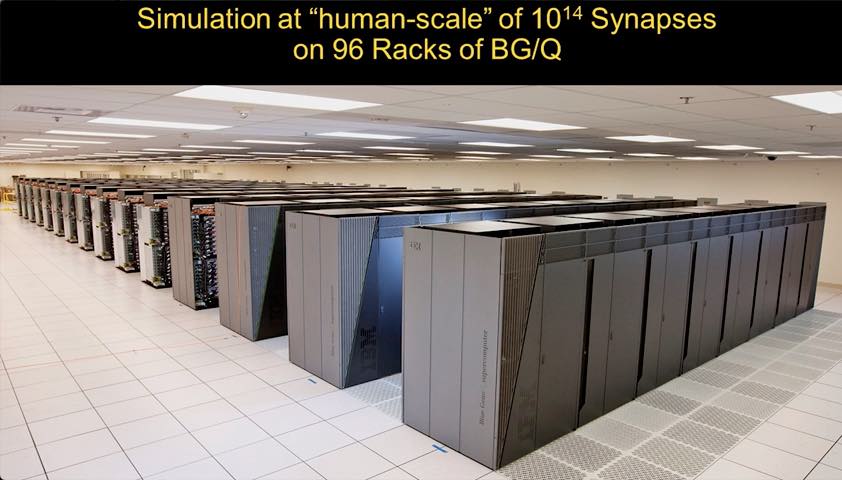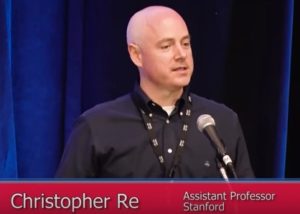In this video from TiEcon 2016, Dr. Dharmendra S. Modha from IBM and Christopher Re from Stanford present: Data Economy – Brain Inspired Computing Will AI & Robotics Make Humans Obsolete.
 “The human brain is an ideal model. It’s small and efficient, and it can process many types of inputs almost instantly. Computers have been compared to brains since the dawn of computer science. More recently, researchers have started to design computers that are modeled on how the brain works, a field now known as neuromorphic computing. IBM has developed end-to-end technology and ecosystem to create and program energy-efficient, brain-inspired machines that mimic the brain’s abilities for perception, action, and cognition. The ecosystem consists of an indexcard-sized board with 1 million neurons; a simulator; a programming language; an integrated programming environment; a library of algorithms as well as applications; firmware; tools for composing neural networks for deep learning; a teaching curriculum; and cloud enablement. The ecosystem will be demonstrated on a number of datasets with near state-of-the-art accuracy and unprecedented energy-efficiency. Today, 100+ researchers at 30+ universities, government agencies, and companies are exploring the ecosystem. IBM has developed new scale-up and scale-out systems — with 16 million neurons — that will be presented in Dr Modha’s pioneering research talk. Watson wins at Jeopardy and enters industrial applications while AlphaGo defeats the human Go champion. No day goes by before the dooms day prediction of AI infused Robots taking over our world comes up in the news. Visions of HAL and Terminator coming alive? Will Artificial Intelligence make us obsolete? Tech optimists like to argue a new revolution in robotics will simply eliminate old jobs and create new ones. Even as large companies look to streamline with the help of automation, new technology also opens up possibilities for new products and services. Adaptation, they contest, is what has seen society thrive since the industrial revolution. Stanford has been in the middle of AI revolution and experts including speaker Dr Chris Re will weigh in on how close we are to AI domination and how data science can help human kind.”
“The human brain is an ideal model. It’s small and efficient, and it can process many types of inputs almost instantly. Computers have been compared to brains since the dawn of computer science. More recently, researchers have started to design computers that are modeled on how the brain works, a field now known as neuromorphic computing. IBM has developed end-to-end technology and ecosystem to create and program energy-efficient, brain-inspired machines that mimic the brain’s abilities for perception, action, and cognition. The ecosystem consists of an indexcard-sized board with 1 million neurons; a simulator; a programming language; an integrated programming environment; a library of algorithms as well as applications; firmware; tools for composing neural networks for deep learning; a teaching curriculum; and cloud enablement. The ecosystem will be demonstrated on a number of datasets with near state-of-the-art accuracy and unprecedented energy-efficiency. Today, 100+ researchers at 30+ universities, government agencies, and companies are exploring the ecosystem. IBM has developed new scale-up and scale-out systems — with 16 million neurons — that will be presented in Dr Modha’s pioneering research talk. Watson wins at Jeopardy and enters industrial applications while AlphaGo defeats the human Go champion. No day goes by before the dooms day prediction of AI infused Robots taking over our world comes up in the news. Visions of HAL and Terminator coming alive? Will Artificial Intelligence make us obsolete? Tech optimists like to argue a new revolution in robotics will simply eliminate old jobs and create new ones. Even as large companies look to streamline with the help of automation, new technology also opens up possibilities for new products and services. Adaptation, they contest, is what has seen society thrive since the industrial revolution. Stanford has been in the middle of AI revolution and experts including speaker Dr Chris Re will weigh in on how close we are to AI domination and how data science can help human kind.”
Dr. Dharmendra S. Modha is an IBM Fellow and IBM Chief Scientist for Brain-inspired Computers. He is a cognitive computing pioneer who envisioned and now leads a highly successful effort to develop brain-inspired computers. The groundbreaking project, SyNAPSE, funded by DARPA to the tune of $53.5M, is multi-disciplinary, multi-national, multi-institutional and has had worldwide scientific impact. Its resulting revolutionary computing architecture and ecosystem break from the prevailing von Neumann paradigm and constitute a foundation for new classes of ultra-low-power, compact, real-time, multi-modal sensorimotor information technology systems. Dr. Modha has also made significant contributions to IBM businesses via innovations in caching mechanisms for storage controllers, clustering algorithms for services, and coding theory for disk drives.
 Christopher Re is an assistant professor in the Department of Computer Science at Stanford University and a Robert N. Noyce Family Faculty Scholar. His work’s goal is to enable users and developers to build applications that more deeply understand and exploit data. Chris received his PhD from the University of Washington in Seattle under the supervision of Dan Suciu. For his PhD work in probabilistic data management, Chris received the SIGMOD 2010 Jim Gray Dissertation Award. He then spent four wonderful years on the faculty of the University of Wisconsin, Madison, before moving to Stanford in 2013. He helped discover the first join algorithm with worst-case optimal running time, which won the best paper at PODS 2012. He also helped develop a framework for feature engineering that won the best paper at SIGMOD 2014. In addition, work from his group has been incorporated into scientific efforts including the IceCube neutrino detector and PaleoDeepDive, and into Cloudera’s Impala and products from Oracle, Pivotal, and Microsoft’s Adam. He received an NSF CAREER Award in 2011, an Alfred P. Sloan Fellowship in 2013, a Moore Data Driven Investigator Award in 2014, the VLDB early Career Award in 2015, and the MacArthur Foundation Fellowship in 2015.
Christopher Re is an assistant professor in the Department of Computer Science at Stanford University and a Robert N. Noyce Family Faculty Scholar. His work’s goal is to enable users and developers to build applications that more deeply understand and exploit data. Chris received his PhD from the University of Washington in Seattle under the supervision of Dan Suciu. For his PhD work in probabilistic data management, Chris received the SIGMOD 2010 Jim Gray Dissertation Award. He then spent four wonderful years on the faculty of the University of Wisconsin, Madison, before moving to Stanford in 2013. He helped discover the first join algorithm with worst-case optimal running time, which won the best paper at PODS 2012. He also helped develop a framework for feature engineering that won the best paper at SIGMOD 2014. In addition, work from his group has been incorporated into scientific efforts including the IceCube neutrino detector and PaleoDeepDive, and into Cloudera’s Impala and products from Oracle, Pivotal, and Microsoft’s Adam. He received an NSF CAREER Award in 2011, an Alfred P. Sloan Fellowship in 2013, a Moore Data Driven Investigator Award in 2014, the VLDB early Career Award in 2015, and the MacArthur Foundation Fellowship in 2015.
Sign up for our insideHPC Newsletter




